The Spring 2019 Anime Preview Guide
Hitoribocchi no Marumaruseikatsu
How would you rate episode 1 of
Hitori Bocchi no Marumaru Seikatsu ?
Community score: 3.5
What is this?
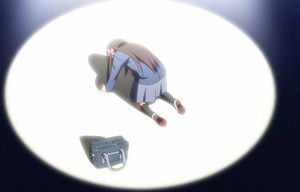 Hitori Bocchi suffers from crippling social anxiety, so she only ever had one friend in elementary school. As she enters a different middle school from that friend, Hatori is given an ultimatum: befriend her whole class if she wants to continue with being friends with her. When various (unrealistic) strategies for reducing the people she has to befriend fails, she eventually works up the courage to speak to Nako Sunao, the girl who sits in front of her who seems so standoffish that she rattles the teacher. So begins the awkward process of connecting to a new friend. Hitoribocchi no Marumaruseikatasu is based on a 4-koma manga and streams on Crunchyroll, Fridays at 3:15 PM EST.
Hitori Bocchi suffers from crippling social anxiety, so she only ever had one friend in elementary school. As she enters a different middle school from that friend, Hatori is given an ultimatum: befriend her whole class if she wants to continue with being friends with her. When various (unrealistic) strategies for reducing the people she has to befriend fails, she eventually works up the courage to speak to Nako Sunao, the girl who sits in front of her who seems so standoffish that she rattles the teacher. So begins the awkward process of connecting to a new friend. Hitoribocchi no Marumaruseikatasu is based on a 4-koma manga and streams on Crunchyroll, Fridays at 3:15 PM EST.
How was the first episode?
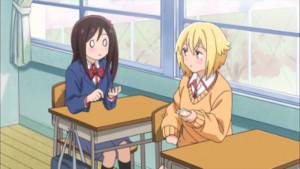 James Beckett
James Beckett
Rating:
I know many people that suffer from social anxiety, and my immediate concern going into Hitori Bocchi no Marumaru Seikatsu was whether the show was going to mine its heroine's psychological anguish for mean-spirited comedy. Thankfully, there doesn't seem to be a mean bone in this show's body, and from minute one it was clear that we are meant to empathize with Bocchi Hitori and find comfort in seeing her overcome the impossibly intimidating minefield of everyday conversation. The writing is sharp enough that there were several reactions and mini-crises that Bocchi exhibits that bore uncanny similarities to how my students and loved ones have expressed their own anxieties.
This could have easily made for the kind of cringe comedy that would hit too close to home for me, but Hitoribocchi's unceasingly bright and optimistic tone won me over in the end. The specific gag that got me on board was when Bocchi's desperate attempt to literally shut down her class and force her classmates to relocate ended up making them more social and excited. It's a cute and funny gag that explores how Bocchi's anxieties lead her to either shrink down too small or take things further than might be socially acceptable, but she's never framed as foolish or weak for it. She's just a kid who really hates talking to strangers, but little by little Bocchi gets better at it, which makes all of her missteps and false starts bearable to watch.
Her friendship with Nako was also a treat, because it felt realistic to that kind of dynamic. Nako is very blunt, and she makes no bones about when Bocchi is being too extra, but she's never fake either. She might call Bocchi “Barf” to her face, on account of Bocchi throwing up in her mouth after being asked to introduce herself to the class, but it's never intended to be hurtful. When Nako walks home with Bocchi in the rain and teaches her how to use emojis and text like a pro, there's no doubt that it's because of a genuinely growing affection between the two.
If I had one minor nitpick to mention, it'd be in regard to the show's character designs. I'm specifically put off by how the characters' eyes are drawn—the iris and pupils both contain numerous multi-colored shadows and reflections, and the result was distracting in a way that's hard to define. To me, it always seemed like characters were on the verge of rolling their eyes back into their sockets, or like each eye was constantly looking upward at a slightly different angle. I'm sure I'll grow accustomed to it with time, but I'm rarely distracted by such design features, so I thought it might be worth mentioning. It isn't enough to keep me from recommending the show, and if you were put off by the idea of a comedy revolving around a girl with social anxiety, I'd still encourage you to give Hitoribocchi a chance. I suspect it might be one of my go to slice-of-life comedies for the spring season.
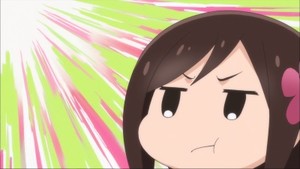 Nick Creamer
Nick Creamer
Rating:
Though it also possesses shades of a character drama, Hitori Bocchi no Marumaru Seikatsu seems most fundamentally a slice of life show, and thus I approached it with my usual method of assessing the genre. Most slice of life shows exist somewhere on a spectrum between “boisterous sitcom” and “holistic tone piece,” offering some combination of those two appeals, and my feelings on them tend to be pretty closely tethered to how well I feel they execute on those poles. Hitoribocchi is definitely more of a comedy than a tone piece, but its appeal extends far beyond its various gags, and I'm happy to say this episode succeeds in basically everything it tries.
In terms of creating a specific tone and place, Hitoribocchi leans heavily on the internal voice of its heroine Bocchi in order to convey a convincing portrait of extreme social anxiety. Though I initially figured Bocchi's anxieties about starting middle school were pretty default new school jitters, the profound difficulty she had talking to basically anybody, and the methods she used to psyche herself up for conversations, were as extreme as they were relatable. Hitoribocchi does a phenomenal job of convincingly illustrating the hurdles that socially insecure people come across, from the way we overthink others' intents, to the personal shame inherent in thinking you're somehow socially defective, to the practice of setting smaller goals in order to build up to larger conversations.
Hitoribocchi's portrayal of social anxiety is so convincing that it'd actually be easy for this show to stray into uncomfortable territory—fortunately, the show is also extremely funny. Hitoribocchi has a natural ear for comic timing, along with lots of expressive reactions and a low-key mastery of slapstick. These comic strengths are significantly bolstered by both Bocchi's relatable surges of anxiety and a bunch of standout comedy set pieces. I particularly loved one sequence where Bocchi tried to conduct a conversation using notes written on her hand, complete with directions to check other limbs' notes for follow-up questions. Hitoribocchi is full of creative and relatable gags that the show iterates on to terrific effect, resulting in an experience that's as funny as it is painfully relatable.
Hitoribocchi's background art and animation are only so-so, but those weaknesses don't really undercut any of its core strengths. On the whole, I highly recommend this awkwardly charming adventure.
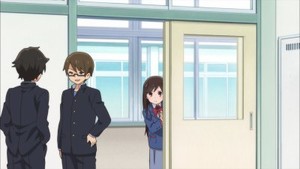 Rebecca Silverman
Rebecca Silverman
Rating:
Speaking as someone with personal experience of both, social anxiety and panic disorders are not funny, and they take a lot of work to learn to cope with. That makes this show's central premise, that socially anxious Bocchi's one friend has abandoned her in order to “help” her overcome her issues, leaving the girl high and dry as she begins middle school, feel more cruel than funny. Even if Bocchi and her friend Kai weren't going to attend the same school, ripping that support out from under Bocchi in the name of helping her make other friends just feels like a lame middle-school excuse to get rid of someone. While I applaud the story for that perhaps unintentional aspect of realism, it doesn't make for a great comedy setup.
What it does do is put the show's heroine in an awkward and uncomfortable position. She's so upset that she tries a variety of bizarre plots to get out of having to meet new people, which again does feel true to the age of the character. Her boldest move, putting a sign on the classroom door saying that the class has been disbanded and people should just transfer schools, makes logical sense to her thirteen-year-old brain, and her horror when it totally backfires is maybe the least uncomfortable piece of humor in the episode. Other things that are clearly meant to be funny tread far too close to being uncomfortable and humiliating for someone with Bocchi's issues, such as when she gets so panicky that she throws up during her self-introduction. The episode skims right over the moment – as in we never see her barf nor do we see her classmates' reaction to it – but the secondhand embarrassment and anguish is fierce.
The potential saving grace is that Nako, the girl she singles out to be her new friend, does seem to recognize that there's something going on behind Bocchi's awkwardness and does make an effort to be her friend. The production values are also fairly high, with smooth animation, attractive and varied art, particularly for character designs, and there's also a higher than usual rate of middle-schoolers acting like actual middle-schoolers, from Nako calling Bocchi “Barf” after her episode to the way that Bocchi thinks and acts. If you've never been a kid like the protagonist, there's a better chance that this will sit well with you. If your middle school experiences were negatively impacted by this very real disorder, however, you may want to pass on this show.
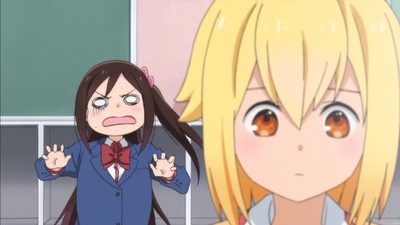 Lynzee Loveridge
Lynzee Loveridge
Rating:
Hitoribocchi falls into a genre that I'm not particularly fond of. It's not offensive or bad, it's actually pretty endearing, the characters are cute with squishy cheeks, the humor is innocuous, and most of story motivations are centered on personal growth and overcoming everyday difficulties. Where I get lost on the majority of these slice-of-life shows starring cute girls is the protagonist. They largely fall into the category of “helpless” with variations for why from the magical to the mundane. Some are just not that bright in general and end up in all kinds of cutesy silly situations that don't hold my interest. That's the generalized reason why slice-of-life moe shows don't do anything for me, but Hitoribocchi is a little different.
Hitoribocchi succeeds by making its star a smidgen more believable. Bocchi is living with pronounced social anxiety. Even if your own experience isn't as extreme as Bocchi's, the little things she struggles with throughout the episode are easier to understand. The pang of embarrassment when you totally screw up a normal social encounter, the cold sweats when speaking in front of a crowd, and trying to figure out how to act without everyone realizing you're a loner are situations that'll speak to a lot of current and previous students' experiences. This endeared me to Bocchi a little more than usual, given that I usually have to grit my teeth when watching similar character types.
I mentioned that the character designs are pretty cute but really the whole production is top to bottom very attractive. There are some distinctive (and weird) character designs mixed in with a few generic ones. Unfortunately, it looks like the generic ones make up the main cast, and the weird girl who showed up to class in a sleep mask is a background classmate. I wanna know what she's up to and if the teacher just lets her snooze all day.
Hitoribocchi looks like it might be more grounded than a lot of shows in its genre. If you think you might relate to it, I could see it worth being given a shot from viewers that might normally skip it. I'm not sure Bocchi as a character will be enough to generate more interest, though.
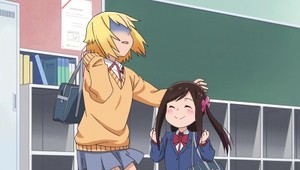 Theron Martin
Theron Martin
Rating:
Crippling social anxiety has been a regular topic in anime over the last few years, with some series taking it at least semi-seriously (WATAMOTE) but more commonly it being a vehicle for light-hearted comedy. This adaptation of a 4-koma manga decidedly falls into the latter category. The result is a first episode which can be quite funny even while being a little uncomfortable.
That the series isn't going to take anything too seriously is evident from the get-go. Rather than being embittered about her inability to make friends, Hitori is surprisingly upbeat. She frets over her difficulty speaking to anyone even while exercising enthusiasm practically on a level of a typical genki girl. That doesn't make her terribly credible, but since this series doesn't seem to be making any kind of statements or probing for any deeper meaning, that's not really a problem, either. Her enthusiasm does allow for some slapstick which generates the episode's funniest moments, such as Hitori's unfortunate propensity to get too close to someone and head-butt them while bowing as part of a greeting or the way she occasionally face-plants the floor. The moments when her outlandish hopes for isolation get utterly crushed can also be amusing, especially the way her attempt to get her fellow students to think the class has been dissolved backfires.
That doesn't mean that the series is ignoring her difficulties communicating with others, however. It is at least somewhat convincing at portraying Hitori's timidity and supreme awkwardness in her efforts to reach out to Nako, and those efforts can be rather sweet. It also actually helps that Nako isn't the most approachable of people, and the scenario here gives the impression that she may also have a difficult time making friends herself for an entirely different reason: she seems unapproachable. That makes me wonder if befriending people who don't easily fit into normal social groups might be an underlying theme of the series going forward, as based on the opener it looks like the foreign girl is eventually going to join the main group. Anime has gotten a lot of mileage out of assembling groups of misfits over the years, and this looks like it could be another such case.
The one concern here is that this approach may be trivializing what is a very real problem for some, so this series probably works best if taken purely at face value. Treat it like that and its decent technical merits and effective humor guide the series towards a mildly positive start.
discuss this in the forum (214 posts) |
this article has been modified since it was originally posted; see change history
back to The Spring 2019 Anime Preview Guide
Season Preview Guide homepage / archives